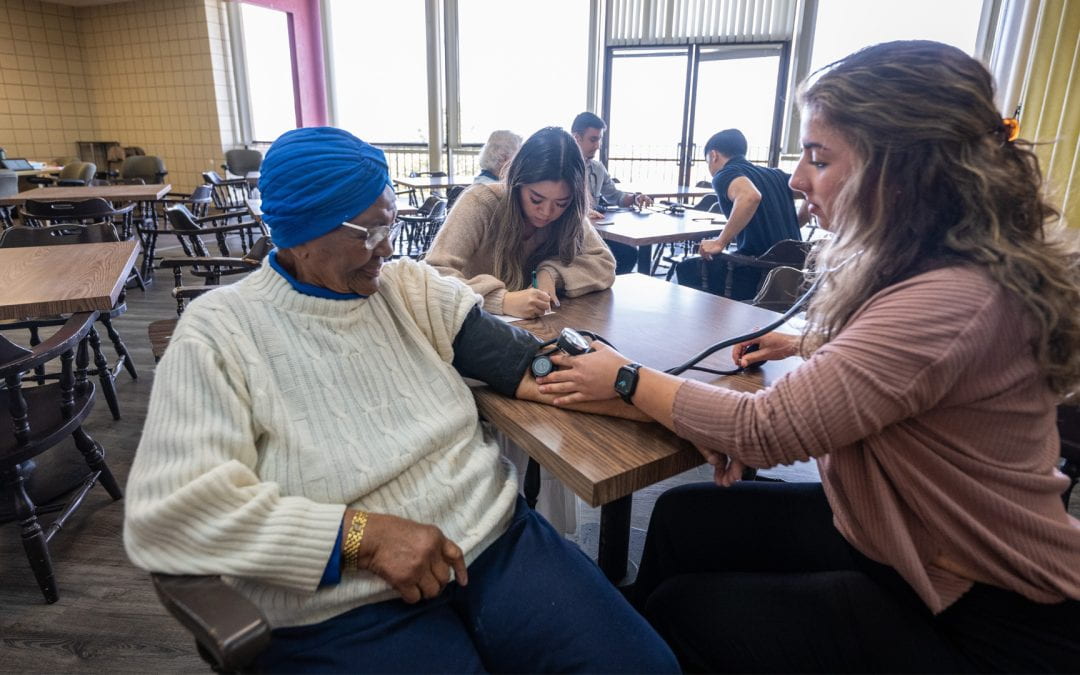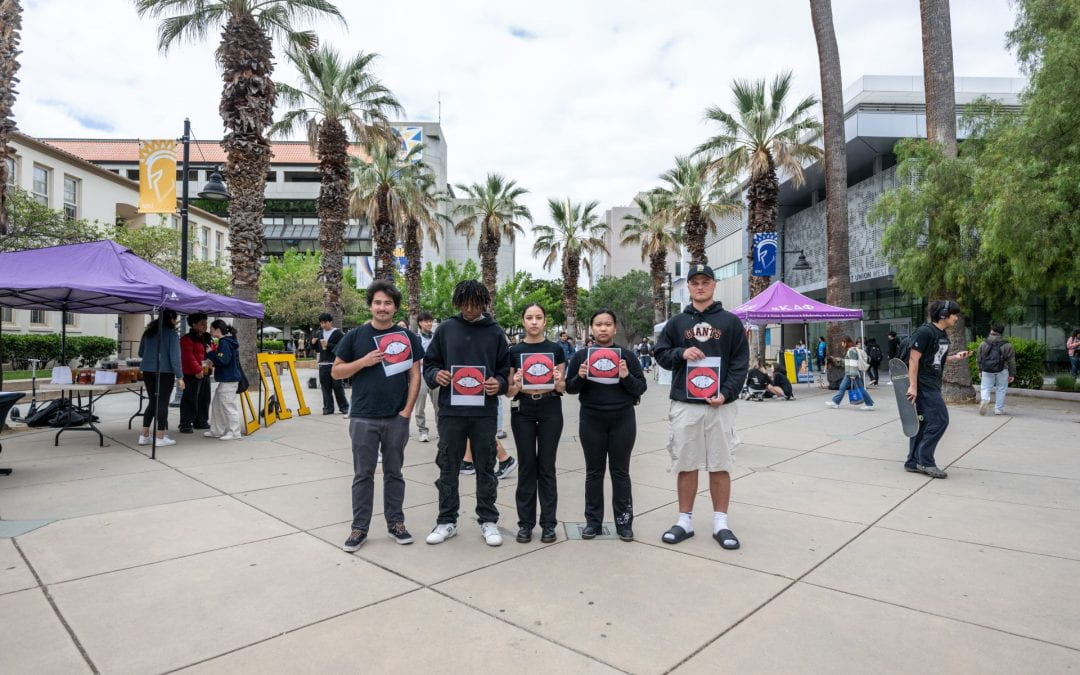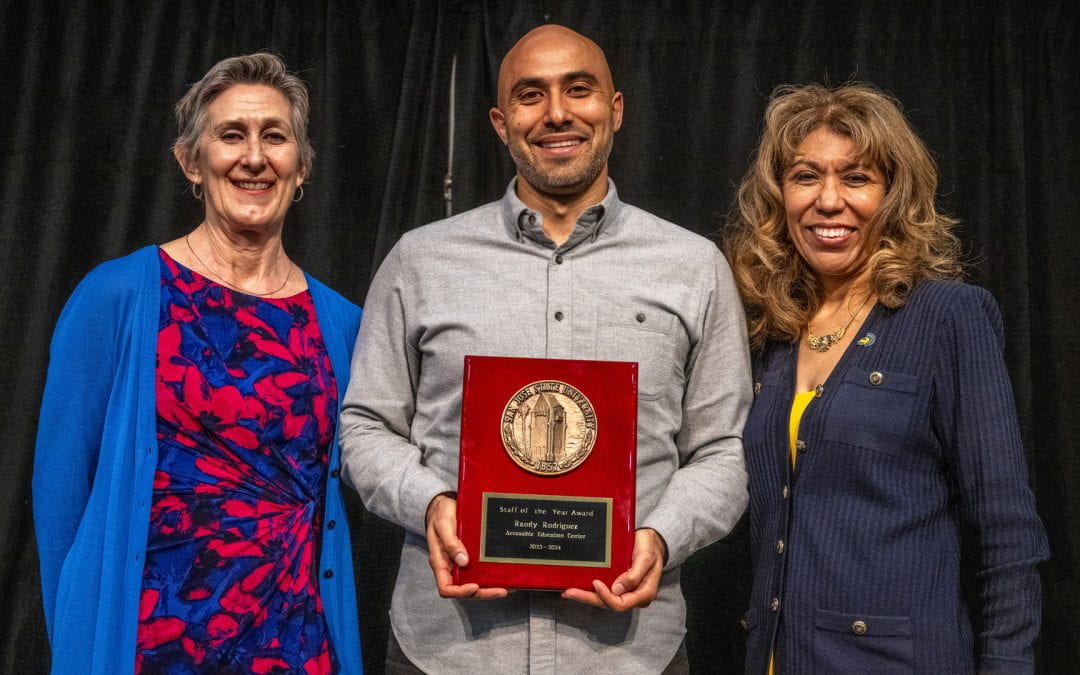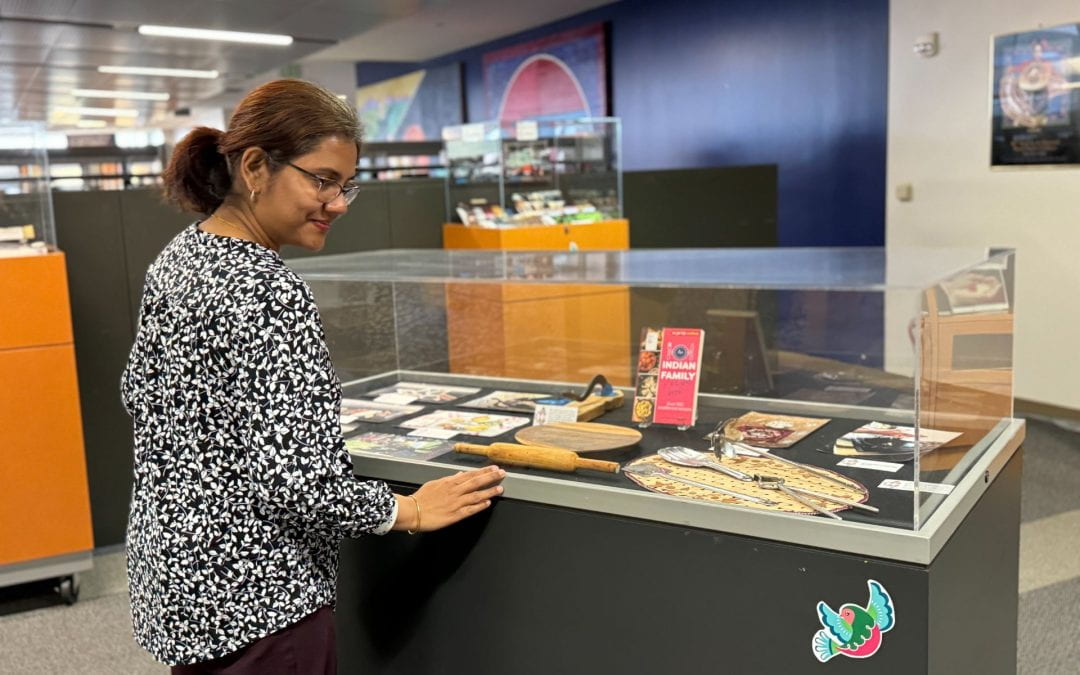Celebrating the Alexanders Exhibition Honors the Good Brothers Legacy at SJSU
When the late Charles “Chuck” Alexander, ’82 Management, arrived at the San José Greyhound Station in 1955, he “carried his trunk to the San José State Athletic department,” said his son Tony Alexander. As a walk-on for the Spartan football team, Chuck learned the university offered no housing for students of color, on or off campus — a remnant of Jim Crow-era housing segregation.
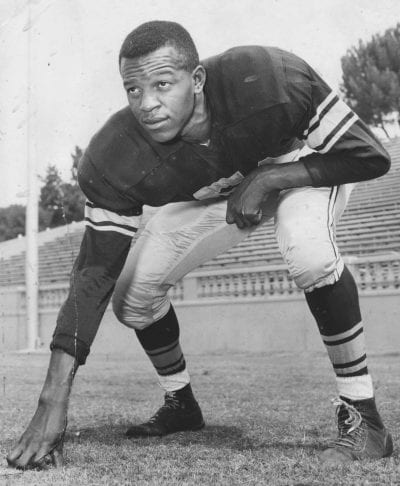
Chuck Alexander played on the Spartan football team in the late 1950s. Photo courtesy of the Alexander family.
Tony said his father knocked on doors in the neighborhoods surrounding the school until he found a house on the corner of Fifth and St. John streets that would rent rooms to Black tenants. In time, the 10-bedroom boarding house became a welcoming space for students of color to live, study and socialize.
The house, later given the moniker the Good Brothers House, became a haven for 1960 Olympic gold medalist Ray Norton; Melvin Newton, brother to Huey Newton, co-founder of the Black Panther Party; Pan American gold medalist Bobby Poynter, ‘65 Kinesiology, and an entire generation of student-athletes, community leaders and entrepreneurs who preceded the Civil Rights Movement at San José State.
“The [Good House] never turned anyone away,” Tony recalled. “They formed study groups, and if anyone ever needed a place to stay, they could stay at the Good Brothers House. Members of the Latino [Mexican American and Chicano/a] community and labor leaders would often come by.”
Images of the Good House will be among the materials on display as part of the upcoming exhibition, “Celebrating the Alexanders: Community. Activism. Art.,” at the Africana, Asian American, Chicano, & Native American Studies Center at San José State’s Dr. Martin Luther King, Jr. Library. The exhibition kicks off on Sunday, February 5, from 1-4 p.m., and will last through March. It is free to the public.
A legacy of goodwill and social action
The exhibition is curated by SJSU Associate Professor of Journalism Duane “Michael” Cheers in partnership with the Alexander family and sponsored by the Antioch Baptist Church Historical and Archive committee, JW Consulting Group LLC, Minority Business Consortium, SJSU Athletics, the Black Legend Awards of Silicon Valley and the African American Studies Department at SJSU.
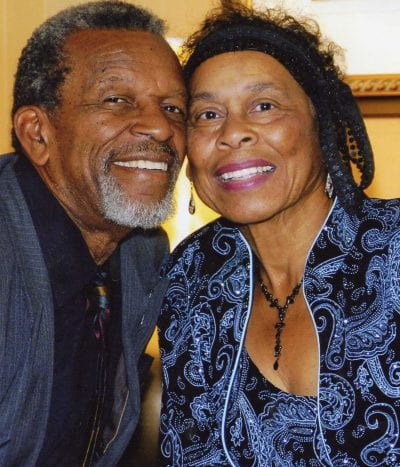
Chuck and his late wife Saphrona Alexander, ’80 Liberal Studies, were pillars in the Antioch Baptist Church and the greater San José community for decades. Photo courtesy of the Alexander family.
It will include paintings by Chuck’s late wife Saphrona, ’80 Liberal Studies; as well as images and memorabilia relating to Chuck’s fraternity, Kappa Alpha Psi, and Saphrona’s Alpha Kappa Alpha sorority; SJSU Athletics and the Good Brothers; and the Antioch Baptist Church, the second oldest African American church in San José, where the Alexanders became members in 1960.
Chuck, a self-taught photographer who worked 25 years at the Santa Clara County Probation Department, contributed many of the images in the exhibition, as did Cheers. Though the two photographers and longtime friends initially planned to host the exhibition in summer 2020, the pandemic forced them to reschedule. Chuck was actively involved in planning the collection until his death in January 2023, a few weeks shy of the opening.
Cheers first met Chuck at Antioch Baptist Church in 2008, not long after he moved to San José to teach at SJSU’s School of Journalism and Mass Communications. The church, located a few blocks off campus, was established as an active gathering place for leaders in the San José Black community to congregate, worship, socialize and organize.
“The first person I met when I opened the door to the church was this gentleman usher named Chuck Alexander,” Cheers recalled. “He was so welcoming and warm, and Chuck had such a smile. He and I would often [meet for] fellowship, and he would teach Bible study and share stories about his time at San José State. And the rest is history.”
The rest became history — Chuck’s community leadership often coincided with political campaigns at the local, regional and national levels, earning him a 2015 Silicon Valley Black Legends Award. Chuck’s involvement with the Good Brothers House stands out as a testament to his dedication to fellowship and service, said Cheers.
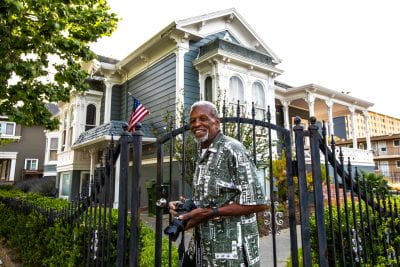
The late Chuck Alexander, ’82 Management, co-founded the Good Brothers House as a haven for students of color at San José State in the late 1950s. In summer 2022, he revisited the house, pictured here. Photo by Michael Cheers.
Last summer, Cheers took Chuck’s portrait in front of the Good Brothers House on Fifth Street. An American flag waves outside the blue Victorian as Chuck smiles in front of the black iron wrought gate, camera in hand. Behind him the scalloped white edge of a porch waits, perhaps whispering secrets of Good Brothers years before.
“The history is what the history is,” Cheers said. “The fact that Black athletes couldn’t find housing on campus in the 1950s is still very sad and troubling. I’ve taken it upon myself as a faculty member in journalism to spend my tenure at SJSU photographing and doing exhibitions on the African American community. I want to do my part to make sure that his legacy, and the Good Brothers House legacy, lives on.”
About the AAACNA Center at the Dr. Martin Luther King, Jr. Library
The Africana, Asian American, Chicano, & Native American Studies Center (formerly the Cultural Heritage Center) was established in 2001 by San José State President Robert Caret. The center provides a collection of materials to support academic programs, to provide a visible identity for historically underrepresented groups and a physical space where students, faculty and others could access research and educational materials, and to establish a place where members of the community could host events related to the center’s mission.
The center includes three research cultural centers: the Chicano Resource Center (dedicated 1982), the Africana Resource Center (established 1990), and an Asian American Resource Center. It is located on the fifth floor of the Dr. Martin Luther King, Jr. Library. The AAACNA Studies Center is an open stack area. Materials located in the Center are available during Library open hours. To request assistance, please contact AAACNA Director Kathryn Blackmer Reyes, who recently earned an #ILoveMyLibrarian Award from the American Library Association.

